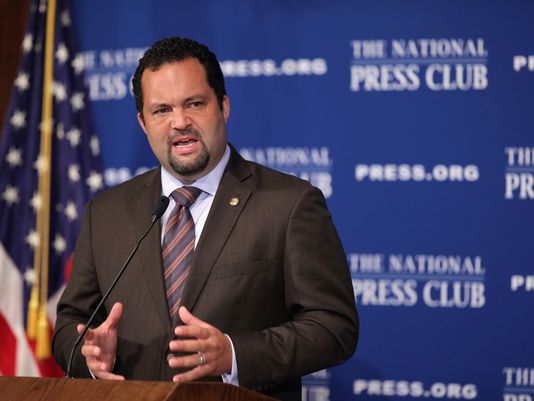
NAACP President Benjamin Todd Jealous says he wants to spend more time with wife, children.
(USA Today) The man who has become the face of the NAACP — from marches protesting the death of Florida teen Trayvon Martin to vigils for death row inmate Troy Davis in Georgia — is resigning effective Dec. 31.
In an interview with USA TODAY, Benjamin Todd Jealous said the constant travel as president and CEO of the nation’s largest civil rights organization has kept him away too much from his wife, civil rights lawyer Lia Epperson, and children, daughter Morgan, 7, and Jack, 13 months. He said he plans to make a formal announcement to his staff Monday morning.
“Leadership knows when to step up and when to step down,” Jealous said. “This day I can say with pride that I’m prepared to step down and make room for the next person who will lead this organization to its next chapter.”
Jealous, 40, said he is talking to a handful of schools within commuting distance of metropolitan Washington about teaching. He plans to continue work with civil rights colleagues toward raising money for a fund to promote black participation in politics.
The civil rights leader said he’s satisfied that he will be leaving an organization that is in much better condition than it was when he took over five years ago. Back then, the Baltimore-based civil rights group was financially shaky and shouldering constant criticism that its aging leadership was out of touch. Now, the organization is solvent, social media savvy and its staff seems to be part of a new cadre of leaders — headed by President Obama — who are diverse, well-educated and visible.
“In the last five years, we’ve had double-digit revenue growth, we’ve spent five years in the black,” Jealous said.
Under Jealous, the donor base has grown from 16,422 in 2007, just before he started, to 132,543last year. Revenue has grown from $25.7 million in 2008 to $46 million last year. Out of a total score of 70, independent non-profit reviewing organization Charity Navigator gives the NAACP 51.42 for finances and 70 for accountability and transparency.
When Jealous came in at age 35, he was hailed as the youngest leader of the organization in its history, although some questioned whether he was old enough to serve and the board vote approving him was close. As a lifelong activist, he was known in the civil rights community but not by the general public. Over the years, he changed that, appearing in public constantly, often alongside other civil rights leaders. If there was a major regional or national civil rights event, Jealous was often there with rolled-up sleeves.
Fans praise his energy, but Jealous has had bumps too. In 2010, he faced criticism when he condemned black USDA employee Shirley Sherrod after a deceptively edited video appeared to show her making biased remarks about her work with a white farmer. Sherrod’s comments were actually part of a longer speech in which she discussed overcoming her prejudices.
Jealous grew up in California, the son of civil rights activists. He was suspended from Columbia University for organizing student protests, but returned later to graduate, also becoming a Rhodes Scholar and earning a graduate degree from Oxford. He’s worked as an investigative reporter for Mississippi’s Jackson Advocate and also was founding director of Amnesty International’s Human Rights Program.
Jealous said a couple of instances reinforced that he needed to move to his next stage in life. His daughter reminded him he’d promised to only stay in the job five years (it was really something, he said, that he told her to appease her). And in February 2012, he was two blocks away from home, heading out for a much-needed, non-travel week at the NAACP offices, when he got a call about the death of Trayvon Martin. He went back home, told his wife he’d be gone two days, and wound up traveling to Sanford, Fla., on that case many times over the months after that.
Read more here


